Inspiring Jews we lost in 2015
(JTA)-As 2015 winds to a close, we'd like to take a moment to honor the memories of those who we lost over the past 12 months. From remembering lives cut short by senseless, dark tragedies to tributes to revered icons who lived life to the fullest, here are some Jews whose deaths left their legacy on the year that was.
Theodore Bikel, 91
Bikel, who died on July 21 of natural causes, was best known for playing Tevye in the stage production of "Fiddler on the Roof" more often than any other actor. He was also the first to play Capt. Georg von Trapp in the original Broadway cast of "The Sound of Music."
Outside the theater, Bikel was a prolific folk singer who recorded 27 albums in Hebrew and Yiddish-languages in which he was fluent.
Bikel championed various causes during his life-including the Soviet Jewry movement and the progressive Zionist movement-and linked his activism to his experience living through the Nazi invasion of his native Austria in the late 1930s. He planned for his tombstone to read "He Was the Singer of His People" in Yiddish.
Dave Goldberg, 47
A veteran Silicon Valley entrepreneur and husband of Facebook COO Sheryl Sandberg, Goldberg died suddenly on May 1 after falling on a treadmill and sustaining a brain trauma while vacationing in Mexico with family and friends. The CEO of Survey Monkey, Goldberg had worked previously at Capitol Records and founded his own media company.
Sandberg immortalized her husband through two heartfelt Facebook posts-one immediately after his death and the other after sloshim, the 30-day Jewish mourning period following the burial of a close relative-that were shared over 400,000 times.
"I think when tragedy occurs, it presents a choice," the "Lean In" author wrote. "You can give in to the void, the emptiness that fills your heart, your lungs, constricts your ability to think or even breathe. Or you can try to find meaning."
Rachel Jacobs, 39, and Justin Zemser, 20
On May 12, an Amtrak train heading from Washington, D.C., to New York City derailed and crashed in the Port Richmond area of Philadelphia, killing eight and injuring most of the 230 surviving passengers. Two of those killed in the horrific crash-Rachel Jacobs, CEO of the online education start-up ApprenNet, and Justin Zemser, a sophomore at the U.S. Naval Academy who aspired to be a Navy SEAL-were Jewish.
Jacobs, the daughter of Michigan State Sen. Gilda Jacobs, had worked at McGraw Hill and launched an entrepreneurship nonprofit called Detroit Nation encouraging ex-Detroiters to support their hometown. The Washington Post described her career as "moving from one big job to the next." She lived in New York with her husband and 2-year-old son.
Zemser was the valedictorian and student government president at his high school in Rockaway, New York, in the borough of Queens. He was also the co-captain of his high school football team and played on the Naval Academy's sprint football team, a varsity sport for players weighing 172 pounds or less.
Faigy Mayer, 30, and Sara Mayer, 31
To the outside world, Faigy Mayer did not show many distressing signs-she happily worked as a coder and her Twitter feed said she loved life. However, she had struggled with mental illness and a variety of issues since leaving her Hasidic community six years ago. On July 20, she jumped from a rooftop bar in Manhattan to her death.
Her death led to a new level of public interest in the closed world of Hasidic Jews and the potential consequences associated with going "off the derech," or off the path of Hasidic Orthodoxy.
Four months later, Faigy Mayer's sister Sara, who still lived in the family's Belz Hasidic community, hanged herself. She also struggled with depression, although it was revealed that her condition worsened after being subjected to physical and mental abuse from relatives and being forced to marry her first cousin.
Leonard Nimoy, 83
"Live long and prosper," Nimoy's "Star Trek" character Spock used to say. The Jewish actor followed his character's advice.
Nimoy portrayed the half-Vulcan alien-who became one of the most popular television characters of the second half of the 20th century-for four decades. He also sustained a successful Broadway theater career and directed two of the "Star Trek" films.
Nimoy was born to Yiddish-speaking Orthodox parents in Boston's West End and rediscovered his Jewish roots in the late stages of his career. He starred in "Never Forget," a TV movie about a Holocaust survivor who sues a group of Holocaust deniers, and hosted an NPR radio series in which Jewish celebrities read Jewish short stories.
He also employed a Jewish symbol for his entire "Star Trek" career: He based Spock's iconic split-finger salute on a Kohanic blessing that manually approximates the Hebrew letter "shin." Nimoy died Feb. 27 from end-stage pulmonary disease.
Alberto Nisman, 51
The demise of Alberto Nisman, the special prosecutor who at the time of his shooting death was guiding the investigation of the 1994 AMIA Jewish center bombing in Buenos Aires, remains a mystery with enough plot twists to fill multiple Hollywood screenplays.
Nisman was found dead in his Buenos Aires apartment in the early morning on Jan. 19, the day he was scheduled to reveal the details behind his allegations that then-Argentine President Cristina Fernandez de Kirchner and its Jewish foreign minister, Hector Timerman, had covered up Iran's role in the AMIA attack. The gun in Nisman's apartment led police to think his death was a suicide, but subsequent forensic tests appear to have negated the possibility.
His death, which is still being investigated, reignited the media's interest in the AMIA case and highlighted the rifts opened by the case between Argentina's government and its Jewish community. The attack killed 85 and injured hundreds.
Oliver Sacks, 82
The British-born Sacks, a neurologist and an author of books such as "The Mind's Eye" and "The Man Who Mistook His Wife for a Hat," was among the best-selling science writers of the past half-century. The New York Times called him the "poet laureate of contemporary medicine," and his 1973 book "Awakenings" was turned into a 1990 film starring Robin Williams and Robert De Niro.
Sacks was raised in an Orthodox family in London. His homosexuality was not received well by his parents, however, and he moved away from religion. After writing about his terminal cancer in The New York Times in February (a recurrence of a cancer he lived through nine years earlier, in the new form of a metastases in his liver), Sacks revealed a newfound appreciation for Jewish traditions in some of his last essays. He published an ode to gefilte fish in The New Yorker and a meditation on the end of life in The New York Times titled "Sabbath." Sacks passed away at his home in New York City on Aug. 30.
The seven Sassoon children, ages 5 to 16
Gabriel Sassoon was away from his Brooklyn home at a religious retreat in Manhattan on the morning of March 22 when police officers located him at a synagogue to bestow horrifying news: seven of his eight children had died the night before in a fire likely started by a malfunctioning Shabbat hot plate.
The fire-which spared his wife, Gayle, and 15-year-old daughter, Tziporah (she jumped from a window to save herself)-was the deadliest in New York City since 2007. The young victims-girls Eliane, 16; Rivkah, 11, and Sara, 6; and boys David, 12; Yeshua, 10; Moshe, 8, and Yaakob, 5-were flown to Jerusalem, where the family had previously lived, to be buried. They all attended Yeshiva Ateret Torah in Sheepshead Bay, Brooklyn, near their home in the Midwood section.
"God Almighty took seven roses," Gabriel Sassoon said at the funeral in Israel.
Rochelle Shoretz, 42

Kevork Djansezian/Getty Images
Dave Goldberg with wife Sheryl Sandberg in Sun Valley, Idaho, July 10, 2013.
Shoretz was the founder of Sharsheret, a nonprofit that provides educational and support services to Jewish women with breast and ovarian cancer. The organization, which Shoretz founded in 2001 while undergoing chemotherapy for breast cancer, now runs programs nationwide and has an operating budget of over $2 million.
"When I was diagnosed, there were a lot of offers to help with meals and transport my kids, but I really wanted to speak to another young mom who was going to have to explain to her kids that she was going to lose her hair to chemo," Shoretz told JTA in 2003.
Shoretz, an Orthodox Jewish lawyer who once clerked for Supreme Court Justice Ruth Bader Ginsburg, died May 31 from complications of her cancer, which resurfaced in 2009. She was remembered by colleagues and friends as being "superhuman" and "compassionate," and participated in triathlons even after her cancer came back.

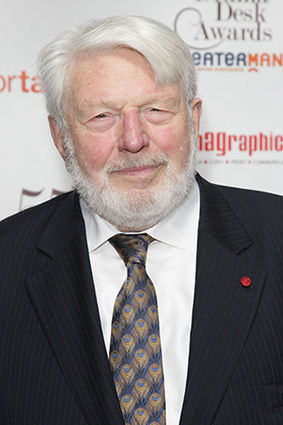
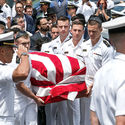
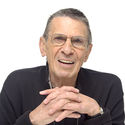
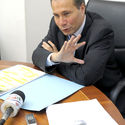
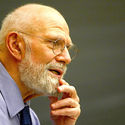
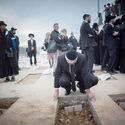
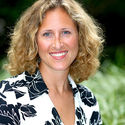
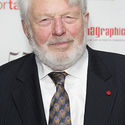
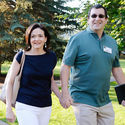










Reader Comments(0)